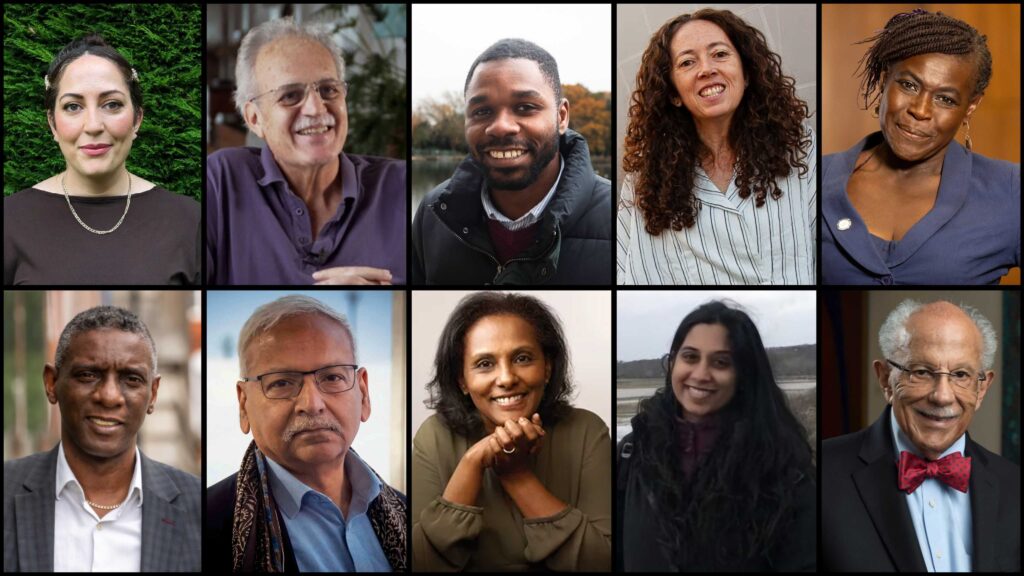
Standing firm in power and pride: 10 researchers of colour shaping our planet’s future
The theme for Black History Month 2025 in the UK is “Standing Firm in Power and Pride”, celebrating resilience, strength, and commitment to progress, highlighting contributions of Black leaders, activists, and pioneers, and looking toward continued empowerment and growth.
At the National Centre for Atmospheric Science, we wanted to bring your attention to the environmental scientists, communicators, and activists whose work has shaped our world – a mix of people of colour, across genders, from different fields, from the past and the present day.
Meet some of our contemporary figures
Amiera Sawas
Head of Research and Policy at Fossil Fuel Non-Proliferation Treaty Initiative
Research area: Climate justice, advocacy, and engagement
Known for: Bridging climate science with social justice, especially for marginalised communities
Impact: She is doing regional and national climate change related security work, focusing in Pakistan, evidencing links between climate change responses, gender and violence.
Carlos Nobre
Born 1951, Brazilian
Research area: Meteorology and climate science
Known for: Spearheading the multi-disciplinary, multinational Large-Scale Biosphere-Atmosphere Experiment, a program which revolutionised the understanding of the Amazon rainforest and its role in Earth climate systems
Impact: His work informed global understanding of deforestation, climate tipping points, and biodiversity loss.
Charles Ogunbode
Assistant Professor in Applied Psychology at the University of Nottingham
Research area: Environmental psychology and climate engagement
Known for: Understanding how people in different social groups experience and respond to environmental change
Impact: He facilitates large-scale climate action and enhances people’s health and wellbeing.
Jackie Faherty
Born 1977, Puerto Rican American
Research area: Astrophysics and data science
Known for: Work in stellar and planetary atmospheres using large-scale astronomical surveys
Impact: She is advancing methods used for atmospheric modelling on exoplanets, which parallel Earth’s climate modelling techniques, and creating more opportunities for underrepresented minorities to enter science fields.
Maggie Aderin-Pocock MBE
Born 1968, British-Nigerian
Research area: Space science and science communications
Known for: Managing observation instruments on the Aeolus satellite measuring wind speeds to help investigate climate change
Impact: She pioneers public science communication, specifically relating to school children, myth-busting science careers, and discussing class and gender barriers within science.
Mark Richards
British Jamaican, Senior Teaching Fellow at Imperial College London
Research area: Atmospheric physics
Known for: Remote sensing of trace gases in the atmosphere, with particular emphasis on air quality and urban air pollution
Impact: He co-founded a technology business, Duvas Technologies, that develops instrumentation to monitor and map air quality in real time.
Saleemul Huq
1952–2023, Bangladeshi-British
Research area: Climate change and policy
Known for: Expertise in climate adaptation and resilience, especially from the perspective of developing countries
Impact: He was a leading voice ensuring that climate science informs equity-focused global policy.
Segenet Kelemu
Born 1957, Ethiopian
Research area: Molecular biology and environmental science
Known for: Research on tropical crops, plant disease control and pests at the molecular level
Impact: She improves the resilience of food systems and public health under changing climate conditions in Africa, and inspires others to pursue careers in science.
Serayna Solanki
Freelancer based in Spain and UK
Research area: Climate change justice
Known for: Supporting climate policy advocacy through education and training, and analysing climate reports through a racial justice lens
Impact: She has been highlighting and advocating for the experience of people of colour in relation to climate change, and enhancing climate engagement amongst minority communities.
Warren Washington
1936 – 2024, African American
Research area: Atmospheric science and climate modelling
Known for: Pioneering computer-based climate models at the National Centre for Atmospheric Research (NCAR)
Impact: His simulations laid the foundation for the Intergovernmental Panel on Climate Change (IPCC) reports that inform global climate policy.
How their work is changing the world
Climate modelling pioneers like Washington helped predict global warming decades before it became mainstream.
Physics and space scientists like Aderin-Pocock, Faherty and Richards go beyond our atmosphere, utilising planetary research to further our understanding of the air around us, and champion wide ranging science communication.
Environmental stewards like Nobre, and Kelemu developed practices that protect ecosystems, food security, and enhance climate resilience.
Global voices like Huq, Ogunbode, Sawas, and Solanki bridge science and policy, ensuring vulnerable communities are not left out of climate solutions.
Diversity of thought, personhood and background is imperative to the future of innovative science research. Equitable and inclusive climate research is reliant on diverse and wide reaching information gathering, connecting with all people impacted by climate change, and advocating for those most impacted by the extremes of the climate crisis.
